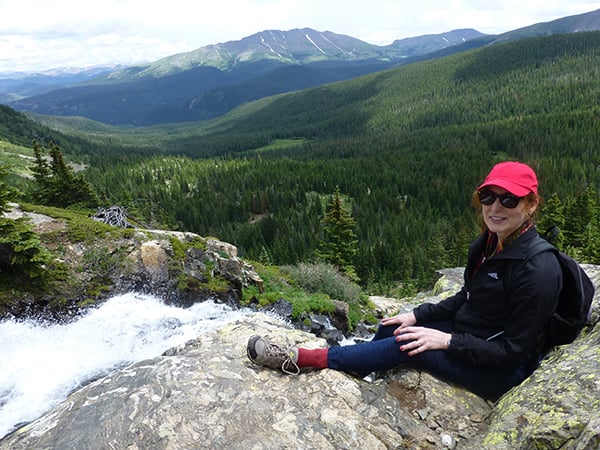One night this past week I had a very vivid dream. I was running- where I didn’t know, I just knew that I had to get there fast. I was running down a long stretch of road, and I was clutching a golden nugget in my hand. It slipped from my grasp as I ran. I looked back at it gleaming on the road and thought to myself, “I’d better keep running- I’ll come back later and get it- right now I’ve got to keep running.” Then a little voice inside my head said “Come back and pick me up now, or you never will.” It was not a voice to be denied. And so I did. And as I knelt in the road to pick the nugget up, it gleamed on my palm. A feeling of relief welled up within me, relief that I had not made the mistake of leaving behind the most important thing.
I wondered where this vivid dream came from. I couldn’t blame it on eating chocolate cake before bed, because I had had a virtuous bowl of rice chex and skim milk instead.
But at the start of a new year, none of us has time to sit around contemplating the source of our dreams. We need to focus on planning and prioritizing to make more efficient use of our time in 2012.”The only trouble with that focus is that sometimes I have this nagging feeling that I’m doing things efficiently, but that maybe they’re not the right things, not the most important things. Maybe I’m not leaving the most important things behind.
Stephen R. Covey’s classic self help book First Things First, first published in 1996,is still a great read for the beginning of a new year.In it he points out that many of us live by the clock, constantly running, trying to cram more activities into less time. What we need to be doing for a deeply satisfying life is to live by the compass- the true north that is our inward direction toward fulfillment of ourselves and care for others. The wise men followed the star as their compass and it led them to the Christ child. We today follow that Risen Lord, whose teachings form a compass for our lives.
The Sermon on the Mount (6:25-34) supplies us with two principles that will help us prioritize the New Year. They form a twin compass to guide the daily life of a disciple in 2012. They take the form of a negative and a positive: a “don’t” and a “do.” 1. The first is don’t be anxious. 2. The second is seek ye first God’s kingdom and God’s righteousness.”
1. Don’t be anxious. Don’t worry. Note, the passage doesn’t say don’t plan. It’s been misunderstood to say that we should lie out in the sun as naked as the lilies and wait for God to clothe us. That we shouldn’t plan menus for the week, or even pack a lunch, we shouldn’t lay out something to wear for tomorrow, or even wear anything at all. Some people, skimming the passage have mistaken it to mean no planning for retirement, no practicing for the big meet, no checking the demographics of the area to determine if we need a new school, no studying for the test, and no responsible foresight. The passage has been misunderstood to say that to have faith means to lack good sense!
But it doesn’t say don’t plan, it says don’t be anxious. A well known story about 16th century reformer Martin Luther recounts that he was trying to do lots of different things at one time. He was a professor at the University of Wittenberg. He had students to advise, lectures to prepare, and a commentary to write. One week, he decided to put to the test the promise he had read in Scripture that “when you open your mouth, the Spirit will speak.” So he didn’t study his scriptural text for the Sunday a bit. Instead he spent the whole week working on his lectures on the Book of Psalms. And when he climbed the steps to the high pulpit and opened his mouth, sure enough the Spirit spoke to him. It spoke directly and clearly. It said, “Martin, you didn’t prepare!”
Any amateur golfer may have a couple beautiful shots in a given round, the result of luck or happy accident. But to have a high percentage of such shots is not for amateurs. A sportscaster once asked golfer Ben Hogan after an especially stunning round, “Ben, how do you account for the consistency with which you make the seemingly impossible shots?” A humble guy, he shook his head and said, “luck?” The reporter persisted- “How can you say that? You practice more hours a week than any other golfer on the circuit!” Ben grinned and said, “The more I practice, the luckier I am!”
It’s important to do the second order things: to plan, to work, to order life, but the first thing is don’t be anxious. As if it all depended on my efforts. As if there were no loving, guiding God as the Lord of the future. I read recently that the average person thinks about 1000 words per minute and that 75% of these thoughts are negative. Anxiety thoughts like “I don’t think I can do that.” or “What if things don’t turn out right?” or, “I don’t think that was the right to thing to say,” or “I don’t think they like me.” or “If I hold this event, what if no one comes?” or “I can’t go on like this.” or “What difference can one person make in a world like this?” ”What is going to happen to me?”
This begs the question: If I eliminate anxious thoughts from my mind, what am I going to think about 75% of the time?
If ever there was someone who had a right to be anxious about tomorrow it was my friend Lucy. She had breast cancer that spread to her bones. Prayer was her mainstay during her radiation treatments. She recounted to me how, before one of her treatments, as she was praying, she saw herself being held in Jesus’ arms and experienced a deep sense of peace unlike any she had ever known before. It was a blanket of peace. And she had the thought, as if Jesus himself spoke to her saying, “I have given my life for you- do you think that I would desert you in your time of need?”
Lucy died a few months later. For me she continues to be an inspiration- if she could accept Christ’s peace in such a situation, isn’t the opportunity open for each of us in ours?
Just before this passage about not being anxious, Jesus says this “You can’t serve two masters.” One way to interpret this is that we can’t live by anxiety and by faith – we must choose one or the other.
What are we going to do with 75% of our thought time? What about seeking first God’s kingdom and righteousness? God’s righteousness is the central quality of God’s character as revealed to us in the Old and New Testaments. Not a rigid moral demand that we be flawless, but the compassion and mercy God habitually shows to human beings.
Do we have to be flawless to enter into this relationship? Not at all. The Israelites before the exile had what was called a ceremony at the gate. The people would process to the entrance of the outer court of the Temple and call into the priest “Who may ascend the mountain of God, who may stand in God’s holy place?” To this the temple priest would call out from the inner court: “He whose hands are clean and whose heart is pure, who does not direct his thought towards evil.” In other words, not the one who is perfect, but the one who is repentant, the one who is willing continually to turn his or her priorities back toward God. For this person, the gates are open to a relationship with God.
A United Methodist Church in Ivyland, Pa. had on its church sign the week after Christmas, “O Come All Ye Faithful, and Anyone Else.” We are all the “anyone else.” Seeking God’s righeousness means, not being flawless, but being willing to say yes to the relationship God seeks to have with us. It means that we daily affirm God’s righteousness, God’s compassionate care and love for us as a reality deeper than our anxious emotions. It means we allow our trust in God to overtakes the 75% of our thoughts that are negative.
I don’t want to keep running down the road of 2012 leaving behind the most important thing. I want to go back and pick up the shining nugget of truth and carry it with me as the run the race of life. “Don’t be anxious. Seek ye first God’s kingdom and God’s righteousness.”












